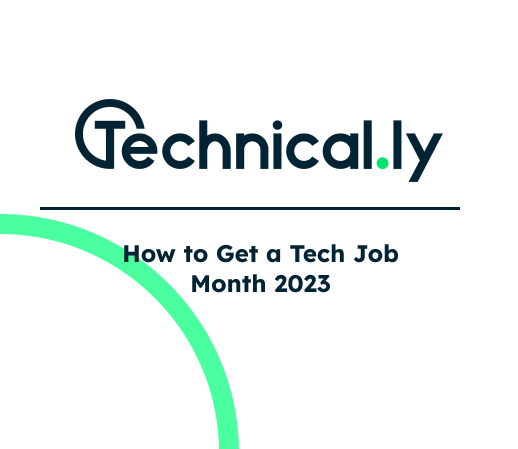Technical.ly’s How to Get a Tech Job Month is coming to an end just as the Class of 2023 is about to graduate.
Whether students are finishing a four-year college or have completed a workforce development program or bootcamp, a new influx of grads are about to be looking for full-time jobs.
As these aspiring technologists set out into the world of job interviews and contract negotiations, we decided to ask our community of technologists on the Technical.ly public Slack what tips or advice they’d give to these newcomers. Here’s some of their best advice.
Be flexible
That thing you studied for four years might not be the thing you ultimately do for your career, at least not forever, and that’s OK.
“Be open to trying something new and adjacent to what you majored in,” said Marissa Taffer, founder at M. Taffer Consulting. “You might find that you love it and want to grow your career there. I went from communications to sales to comms for sales to startup sales to project management. These roles all demanded great communications skills even though they weren’t traditional communications jobs.”
Don’t burn out during the application process
Applying for tech jobs can be as time consuming as a job itself — but don’t let it consume you.
You may be asked to put in more time than should be considered reasonable, said Colin Dean, managing director of Code & Supply and a software engineer for a major retailer.
“Software engineering take-home exercises taking more than an hour are probably asking too much and more than three hours is too much,” said Dean. “If you’re in a position to push back, do it, and help out someone who isn’t in a position to push back by signaling that long take-home exercises are unreasonable.”
While Dean says jobseekers should apply widely, that doesn’t mean dozens of applications a day, considering the work you should be putting into each one.
“One solid application per day is a solid objective, two is good and three is ambitious,” Dean said. “Learn about the company, about the team, about the stack if you can find enough public info. OSINT (open-source intelligence) skills come in handy for focusing in particular areas so if you get to an interview stage, you can really demonstrate your suitability for the position by at least sounding like you know what you’re talking about in an interview while demonstrating interest in learning more.”
And don’t forget to take breaks, including taking time to work on your own projects.
“It might be the last time in your career that you are the sole owner of your work,” Dean said. “Make your own take-home exercises: build bowling scorers, simple reddit or twitter clones, recipe managers, etc. Build up a portfolio while learning something new, especially if you’ve got some runway and don’t need a job desperately right now.”
Don’t expect a remote job
Especially since COVID-19 disrupted the in-person workplace, working at home has been considered a major perk of having a tech job.
Employers, increasingly, are pushing for employees to return to the office, either full time or a hybrid of remote and on-site.
Some of it is about company culture or a desire to return to “normal.” But for new developers, remote isn’t necessarily a good way to start out.
“As a [remote] junior developer, you’re forced to learn on your own,” said Anthony Putignano, now VP of engineering at Fluxx, in a 2021 Technical.ly conversation about remote work. “Juniors need a lot of attention.”
So you’ll want to be prepared to work on site part or all of the time, at least at first.
“Don’t make remote a demand,” tech recruiter Mark Constan said. “I get it. I’m remote. I love remote. But I believe you need to be at least hybrid for your first job. Yes, remote is possible for sure. But you are competing with how many people in the same boat that will do and say what it takes to get their first job.”
Consider the perks of the nonprofit and public sector
If you’re entering tech out of college, you can find benefits outside of the world of private tech firms.
“Consider working for a non-profit, especially if you have large student loans,” Dean said. “Public Service Loan Forgiveness could net a huge return on investment. The nonprofit sector needs tech people, too.”
In addition to 501(c)(3) employers, you can also qualify for Public Service Loan Forgiveness working in tech for public school districts, public transportation, public or nonprofit colleges and universities, and US federal, state, local or tribal government agencies.
Want to join the conversation? Join our public Slack channel:

This editorial article is a part of How to Get a Tech Job Month of Technical.ly’s editorial calendar.
Before you go...
Please consider supporting Technical.ly to keep our independent journalism strong. Unlike most business-focused media outlets, we don’t have a paywall. Instead, we count on your personal and organizational support.
3 ways to support our work:- Contribute to the Journalism Fund. Charitable giving ensures our information remains free and accessible for residents to discover workforce programs and entrepreneurship pathways. This includes philanthropic grants and individual tax-deductible donations from readers like you.
- Use our Preferred Partners. Our directory of vetted providers offers high-quality recommendations for services our readers need, and each referral supports our journalism.
- Use our services. If you need entrepreneurs and tech leaders to buy your services, are seeking technologists to hire or want more professionals to know about your ecosystem, Technical.ly has the biggest and most engaged audience in the mid-Atlantic. We help companies tell their stories and answer big questions to meet and serve our community.
Join our growing Slack community
Join 5,000 tech professionals and entrepreneurs in our community Slack today!

The person charged in the UnitedHealthcare CEO shooting had a ton of tech connections

Delaware students take a field trip to China using their tablets and ChatGPT

From rejection to innovation: How I built a tool to beat AI hiring algorithms at their own game



